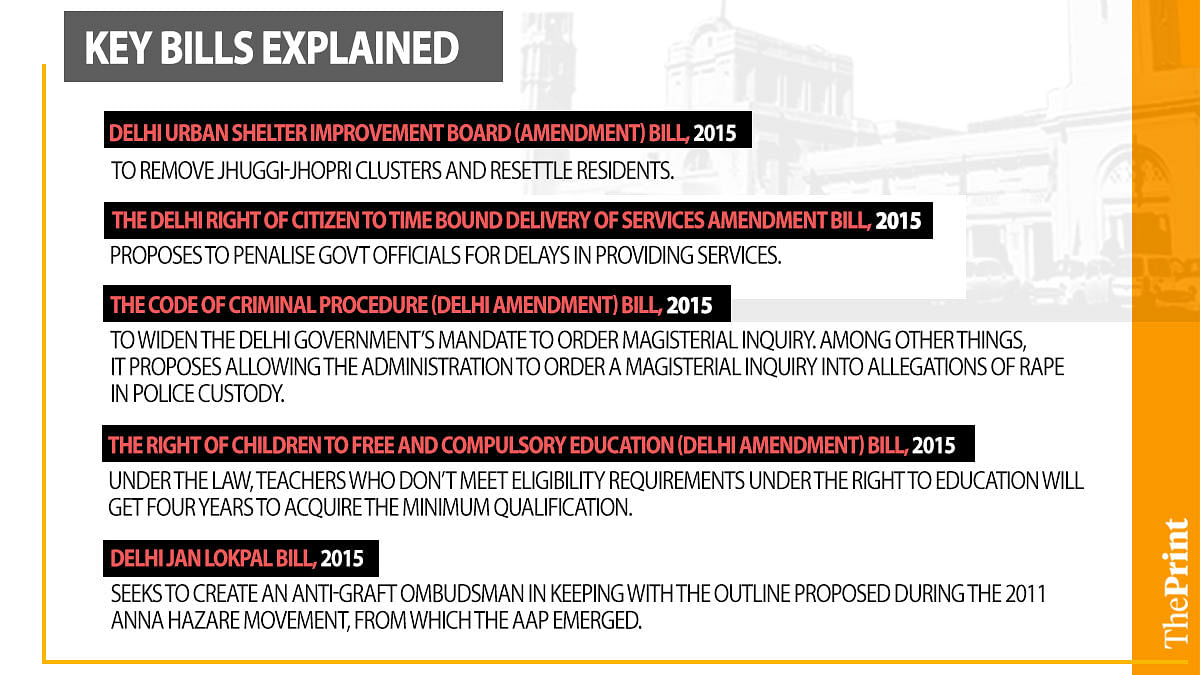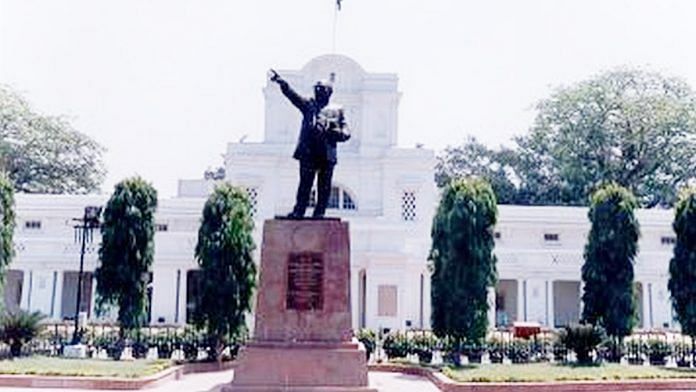New Delhi: Nineteen bills passed by the Delhi assembly since the Aam Aadmi Party (AAP) came to office in 2015 remain pending with the central government, ThePrint has learnt.
These include crucial bills that seek to enforce pay cuts for government officials who delay the delivery of services, empower the Delhi government to order magisterial inquiries into alleged rapes in police custody, and regularise guest teachers.
Assembly speaker Ram Niwas Goel of the AAP said he had been pushing for the bills to be approved by the central government, i.e. the lieutenant governor and the President, as the term of the assembly is about to expire next month.
In Delhi, the lieutenant governor (LG) plays the role of an administrator who represents the President, and thus the central government.
After a bill is passed in the Delhi assembly, it is sent to the LG. It is then forwarded to the Ministry of Home Affairs (MHA), but this is just considered a formality. The bill then returns to the LG.
Once the LG has cleared it, the bill is forwarded to the departments concerned for feedback.
In case the LG has some suggestions to offer, they send it back to the assembly for amendment or reconsideration. Certain bills, meanwhile, are reserved for presidential approval.
Once the term of the assembly ends 22 February, the pending bills will lapse. They will then have to be reintroduced in the next assembly.
ThePrint tried to approach the LG secretariat for comment through messages, calls and emails, but none elicited a formal response. A official in LG Anil Baijal’s office, who did not want to be named, however, said the pending bills had all been forwarded to the Ministry of Home Affairs, and thus weren’t exactly pending with him.
Also Read: Decaf Arvind Kejriwal – the safe, bland AAP chief and Delhi CM no one saw coming
All that’s stuck
According to official Delhi assembly records, 26 bills have received central assent since the AAP came to power in Delhi.
Out of the 19 pending bills, two — the Delhi Sports University Bill 2019, to set up a sports university in the capital, and the Delhi Skill and Entrepreneurship University Bill, an initiative meant to skill youth to tackle unemployment — were introduced and cleared by the assembly only last month, during the two-day winter session.
The key bills that remain stuck with the central government include the Delhi Jan Lokpal Bill, the Delhi Right of Citizen to Time-Bound Delivery of Services Amendment Bill, and the Code of Criminal Procedure (Delhi Amendment) Bill.

While the jan lokpal bill proposes an anti-corruption watchdog, in keeping with the AAP’s primary plank, the Delhi Right of Citizen to Time-Bound Delivery of Services Amendment Bill seeks pay cuts for government officials for delay in extending services to citizens.
The former was passed by the assembly on 4 December 2015, while the latter was first cleared by the house on 26 November 2015. On 30 January 2016, the President returned it to the government seeking clarifications.
It was reintroduced and passed by the assembly again on 11 August 2017, but remains pending.
The Code of Criminal Procedure (Delhi Amendment) Bill seeks to empower the Delhi administration to order magisterial inquiries into allegations such as rape in police custody, mysterious disappearances etc.
Currently, the Delhi government can only order magisterial inquiries into cases such as custodial death, homicide, fire incidents, and suicide by women. The bill was passed by the House on 3 December 2015.
AAP MP Sanjay Singh said the delay in clearance “has occurred due to the constant tussle between the Centre and the state” over distribution of powers in the national capital.
Another AAP member, who did not want to be named, said the LG couldn’t wash his hands of accountability by saying the bills were with the MHA. “The LG is the representative of the central government, so even if the bills have been forwarded to the ministry, technically, we assume they are with him, since we wait for a notification from his end.”
The issue of distribution of powers in Delhi has been a sore point between the Delhi administration and the central government, and set the stage for a fierce faceoff between the AAP government and the LG’s office, including under Baijal’s predecessor Najeeb Jung.
In April 2018, Delhi Deputy Chief Minister Manish Sisodia tabled a “report card” on the LG’s office in the assembly where he blamed him for “major delays” in the approval of government schemes. The LG’s office hit back with a point-by-point rebuttal to the report. Terming the AAP’s report “incorrect and misleading”, the LG’s office said it had approved 97 per cent of the “10,000 files and proposals” sent by the current government “without any change”.
The tussle also reached the Supreme Court, which ruled in July 2018 that the LG is bound by the advice of Delhi ministers in all matters except land, police and public order, over which the central government has jurisdiction.
Also Read: As Delhi gets set to vote on 8 Feb, here’s how AAP, BJP, Congress stack up



